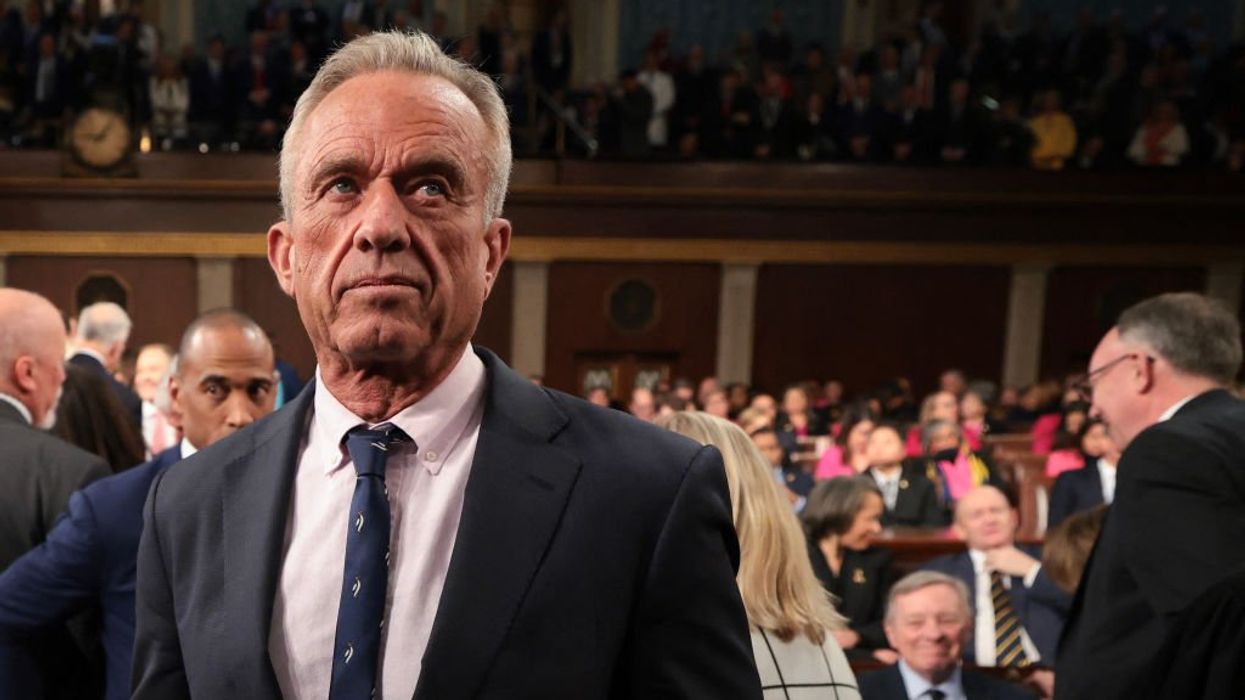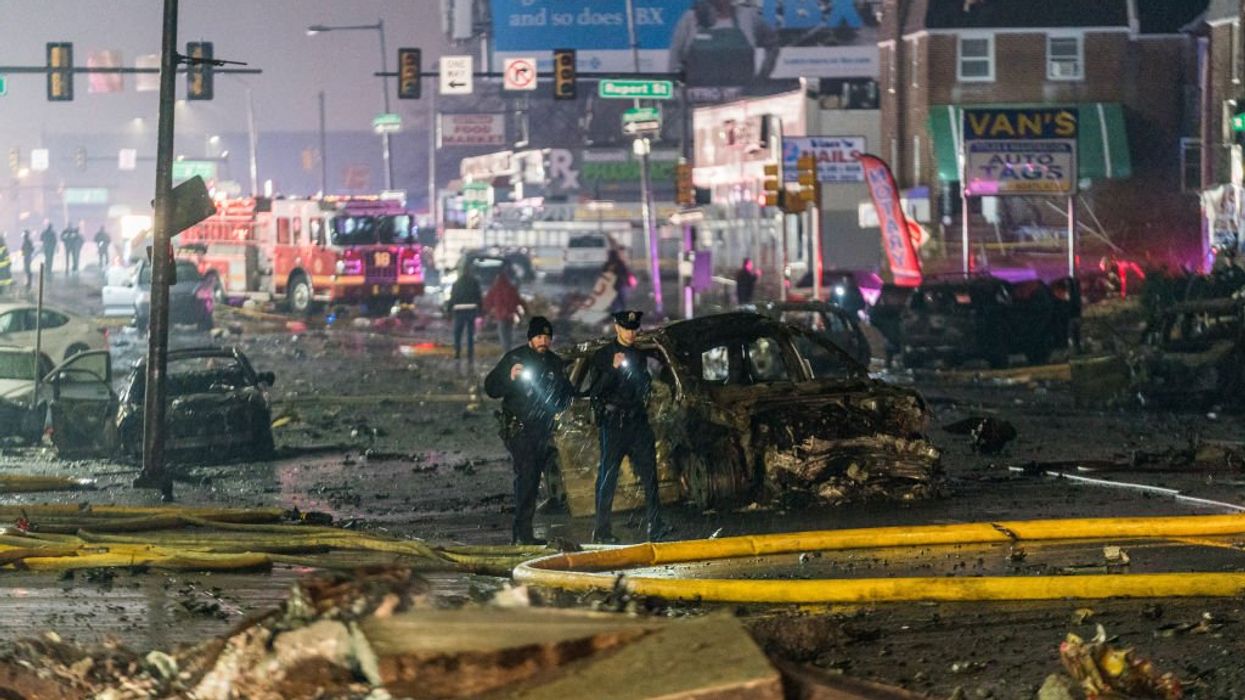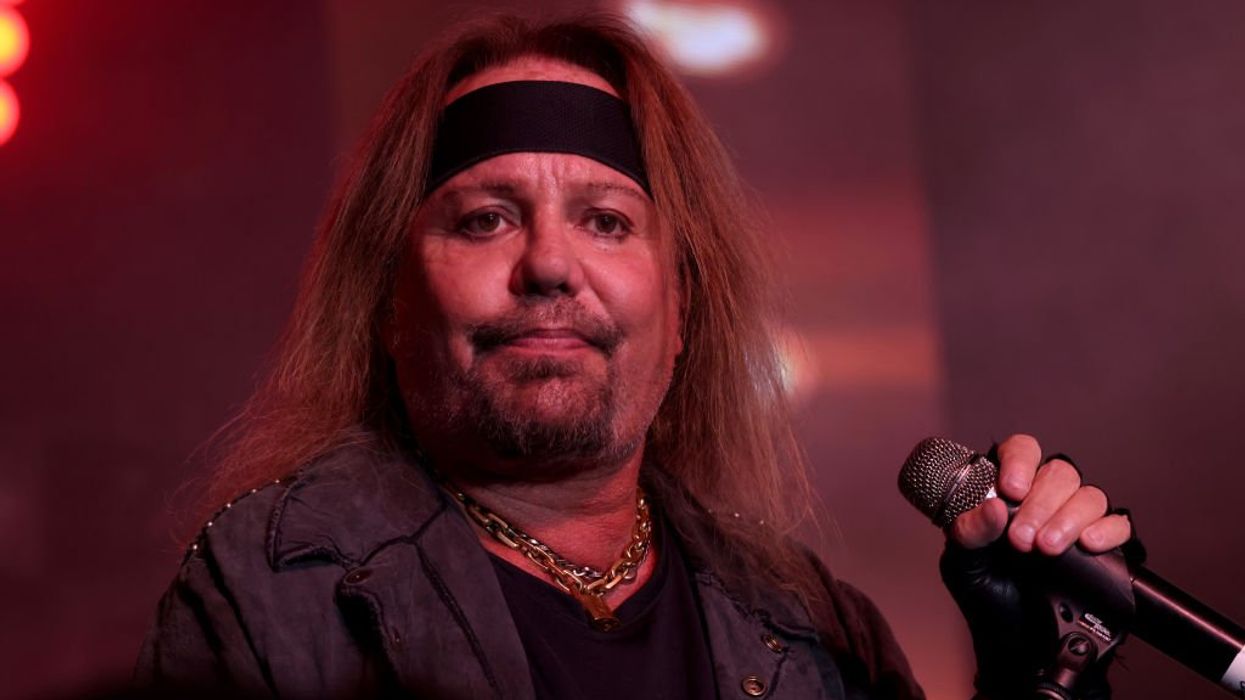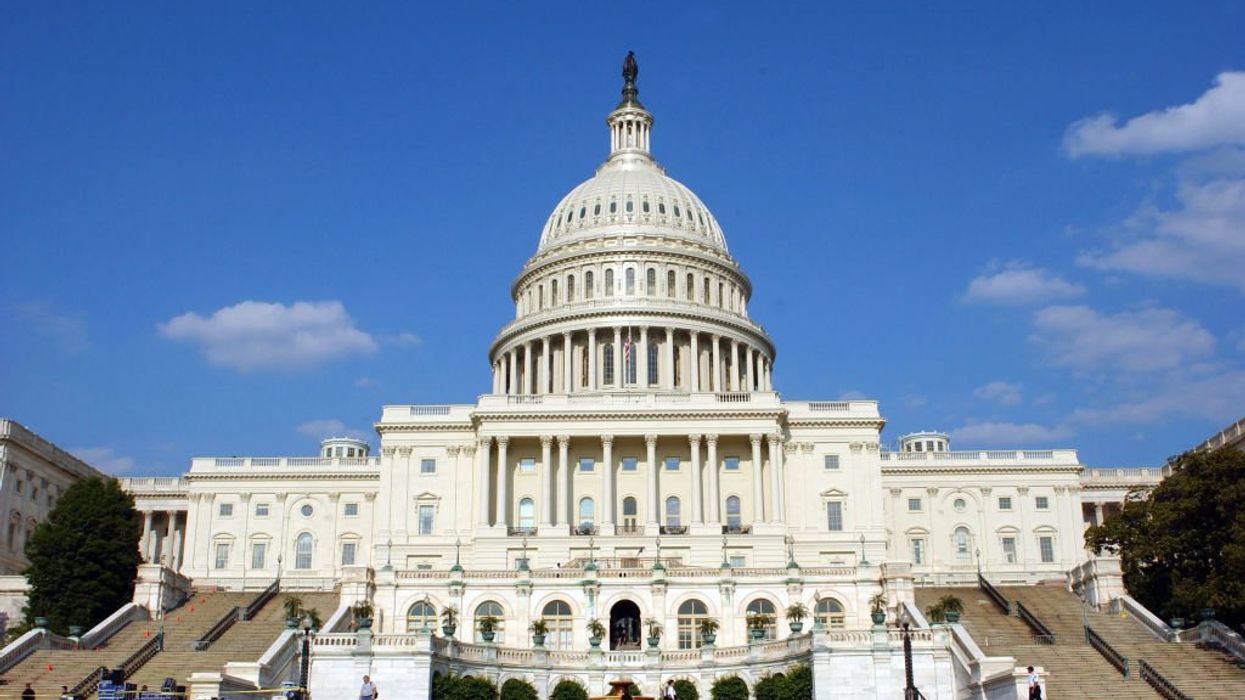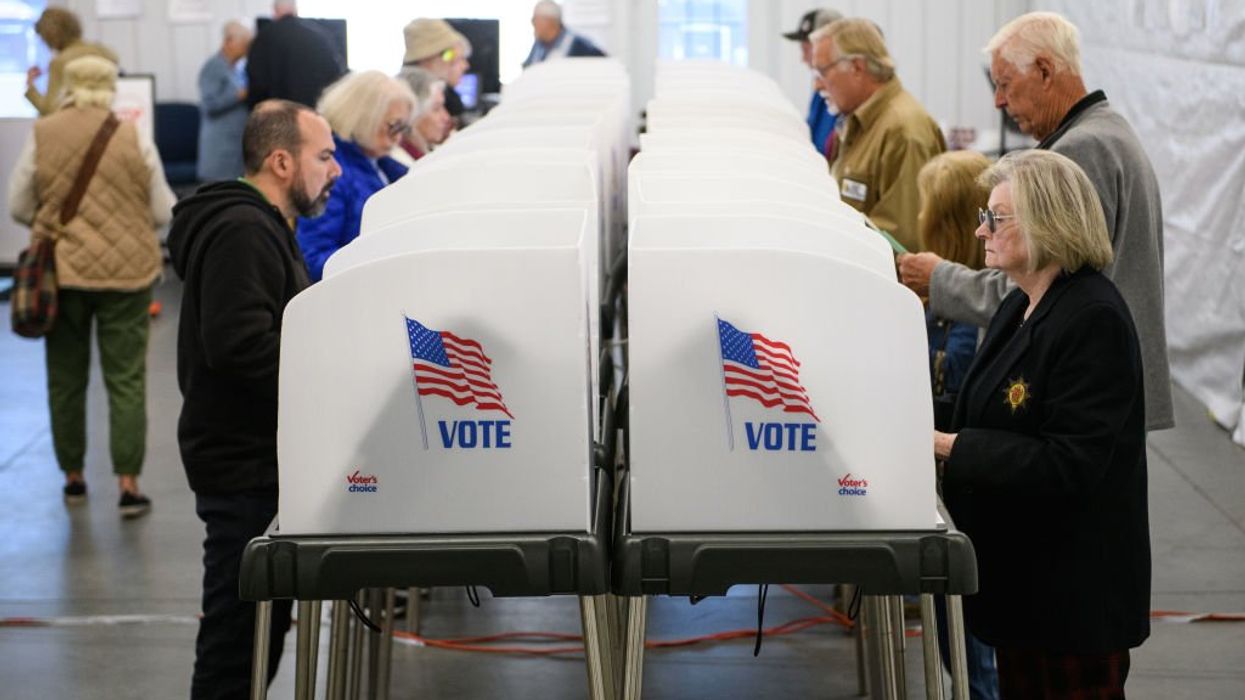Evan McMullin, a former CIA agent, officially entered the presidential race on Wednesday as an Independent candidate, hoping to offer Americans an alternative to what he believes are two terrible choices. He joined The Glenn Beck Program on Thursday to talk about why he's qualified to be president, the three major issues he believes America faces and why he's far better suited for the presidency than Donald Trump or Hillary Clinton.
Following the interview, Glenn asked his co-host what they thought about McMullin.
RELATED: PART 1: Glenn Talks With Independent Presidential Candidate Evan McMullin
"Generally liked him. He's better than some of the other choices," Stu said.
"Liked him," Pat said.
While McMullin appears to be a serious, worthwhile candidate, Glenn identified his biggest challenge:
"Is there enough time for people to listen to him and get comfortable with him? You know, let's see him in a debate. Somebody like that has got to be tested some way or another," Glenn said.
Listen to Part 2 of Glenn's interview with Evan McMullin on The Glenn Beck Program:
Below is a rush transcript of this segment, it might contain errors:
GLENN: We're talking to Evan McMullin from EvanMcMullin.com. He's running for president of the United States.
Evan.
EVAN: Yes.
GLENN: Are you going to get on the ballots?
EVAN: Yes, we've got a multi-pronged strategy. I've got a phenomenal team who has been working on this for months to prepare for this, to prepare for a time at which they had a candidate to run.
We are going to be getting on ballots here in the near-term. We'll be rolling those out. We're excited about that. There are a number of ways to get on ballots. There's a lot of misunderstanding about that. People think that it's only via petition. But there are actually a number of other ways. And we're going to compete across the country.
GLENN: How do you respond to people who say you're a spoiler and you're going to cause Hillary Clinton to win?
EVAN: I would just say this: I mean, look at the numbers, Donald Trump, when we entered the race three days ago, was down 10 percent against Hillary. So he's losing already to a super weak candidate.
GLENN: Yeah, but those numbers are probably going to come back. They usually do, after, you know, somebody else's convention. I'm just playing devil's advocate here.
EVAN: Sure. Sure. Yeah, well, what I would say to that, sure, Donald Trump could, you know, rise in the polls a bit. But listen, Donald Trump has alienated so many groups in America. I mean, you just look at the numbers, and, you know, you can find them where he's polling so terribly among women and Hispanics. You name it. I mean, he's just alienated so many Americans. He just can't win that way.
PAT: He does have 1 percent support among blacks.
EVAN: What's that?
GLENN: He does have 1 percent --
PAT: He does have 1 percent support among blacks.
GLENN: So he's got that going for him.
EVAN: Well, that's good. He should be given a certificate.
GLENN: Yeah. Give me -- tell me what you think the biggest crisis that is coming our way.
EVAN: Well, I wish I could -- I wish there were only one, but I think there are three.
GLENN: Give me two. Three. Okay. Go ahead.
EVAN: Can I give you three? I'll be quick.
GLENN: Sure, yeah.
EVAN: Number one is we absolutely just must defeat Islamist terrorism. I know how to do it. I've been there, done that. We have to do it. And let me tell you something, and a lot of people don't think about it this way: We have to beat Islamist terrorism because the more we allow that threat to metastasize and expand, the more our civil liberties here at home come under threat. So it's not only the attacks and the lethality of those attacks, which is also obviously a priority, to prevent that, but the greater the threat is, the more the government needs to say, "Okay. Well, we're going to do this for security. We're going to do that for security." And our civil liberties start to get peeled back.
And so we have to go on the offensive and destroy these evil threats abroad before they -- before they do that to our country. And so that's one.
Number two is I think we need more economic opportunity in this country. We need to be better about fighting -- smarter about fighting poverty as an issue. I'm very passionate about. We need to be smarter about creating an environment here where -- where -- where companies thrive so that people and families can thrive. So that there's jobs and growth and all of this. The government is in the way of all of this. We need to get it out of the way. That's another thing.
GLENN: Can you give me any specifics on that?
EVAN: Well, yeah, for example, you know, it's true that our trade deals have resulted in sort of some shifts -- some industries shifting from one place or another, and jobs can be lost and all of that. And also due to automation and new technologies, some people are losing their jobs. I think we -- we need to -- we need to listen -- to listen to that reality. It's happening.
And we need to do better -- we need to be better at helping -- helping people be retrained and find new opportunities and continue on. And so one idea that I've had that has worked well elsewhere is to use apprenticeship programs, so maybe we give an incentive for companies to say, "Okay. Well, this man or woman lost their job in this factory because it moved somewhere else, but, you know, I'm making microchips. And I'll bring them in, and there's some incentive to do that. I'll train them up, and they can -- they'll get on-the-job training while they're working, and then we help those people move forward. We help the economy, and we help these families. So things like that, I think we need to do. But it's also about lowering taxes, simplifying the tax code.
PAT: Yes.
EVAN: And most importantly, just cutting back on our -- just -- there's just so much overregulation and such little due process that -- and such -- and such uncertainty, regulatory uncertainty that's a real big challenge that companies face. We've got to limit that.
GLENN: Your third problem that you think we might hit?
EVAN: Government reform. We need to transfer more power back to the people. And that has everything to do with federalism and the Tenth Amendment. We must do this. We live in a large -- there are 330 million people here in this country. It's a big country, geographically. The idea that a centralized government in Washington is going to be able to serve well and be accountable to the people is just fantasy. There needs to be more power to the states, and the people's representatives in Congress also need to have their rightful Article One authorities restored.
GLENN: Can you tell me -- Mitt Romney has made some disparaging comments about the Tea Party. Where do you stand on the Tea Party, the values of the Tea Party?
EVAN: Well, listen, I stand with anybody who understands the -- again, federalism. I stand with anybody who understands and supports the Tenth Amendment, anybody who understands that the power of the government comes from the people and only from the people. And therefore, the government is accountable to the people.
This is -- Glenn, this is something I'm passionate about. Our Founders founded this country with the why, as Simon Sinek, the commentator says -- he talks -- every company needs to have a why. That why for our country was the pursuit of happiness.
If people are going to pursue happiness in their way, they need to actually have a -- a say in their government. And that power needs to be close to them, even though they may delegate it to their representatives. So it's a pursuit of happiness thing for me. That's what federalism is about. That's what the Tenth Amendment is about. We've got to get back to a system that allows people to pursue happiness the way our Founders intended.
GLENN: Pat has probably the best question of the day.
PAT: Well, I mean, I'm glad we've talked about some cute little subjects, but can we get to the real issue?
EVAN: Oh, boy. Here we go.
PAT: I'm wondering if, as president, you would seek a constitutional amendment and maybe even an executive order in the meantime, pending a constitutional amendment, to force your will in making BYU a part of the big 12?
EVAN: Yes, I will absolutely do that.
PAT: You will do that?
EVAN: Yes.
PAT: You have my vote.
EVAN: Okay. Good. All right.
GLENN: What a surprise.
EVAN: I got one. That's great.
PAT: You've got at least one vote.
STU: Wait. You're not voting for yourself? Shouldn't you at least have two?
EVAN: Oh, that's true. That's true. That's right. Yeah, I'm in too.
PAT: Are you married? I mean, hopefully we can at least get a family vote going there too.
GLENN: Are you married?
EVAN: I'm not married. But I want to promise the American people, since I'm making important campaign promises right now, guys -- thank you for that -- that I will not leave America without a First Lady if I'm elected. And it is my biggest aspiration in life to be a husband and a father, and I'm working on it.
(laughter)
PAT: Is there anybody --
GLENN: So, yeah. Is this like the Oval is the greatest chick magnet of all time, or is there somebody that you're thinking about?
EVAN: I really --
GLENN: Is there an announcement you'd like to make here?
EVAN: I really do not want to -- can I just not answer that question? Have mercy, please.
(laughter)
Yeah. That's a tough one. I just better keep my mouth shut.
PAT: So seriously, Evan, the deadline is tomorrow for Utah. Right? For ballot access.
EVAN: The 15th.
STU: The 15th. Okay. So you've got a few more days.
PAT: Okay. So you've got four days. You can make it in four days?
EVAN: Oh, yeah.
STU: A thousand signatures there. Right?
EVAN: Oh, yeah, we've got an army of volunteers out there taking care of this. The threshold of a thousand --
PAT: And what do you do in a state like Texas where the deadline has already passed?
EVAN: We'll probably file a legal challenge there.
PAT: Okay.
GLENN: Do you -- do you have the money to do this?
EVAN: Money is pouring in. Pouring in.
PAT: Is it really?
EVAN: Yeah.
PAT: I mean --
EVAN: Yeah. Yeah. From small donors, regular people who are just so frustrated. I'm telling you -- and you know this, 70 percent of Americans are just unhappy with the direction of the country. They think it's on the wrong track. And then we have two candidates that are historically unpopular and profoundly unprepared to face the challenges that this country faces now.
Americans want something else. So, yeah, I mean, the metrics are unbelievable. I mean, people are helping out. They're chipping in. But, also, we're getting major mega donor interest. We've already had some really critical meetings on that. I'm going to be in New York next week for some -- you know, some follow-up meetings. You know, we're -- we're getting some good signals there too. So we're very excited, and we feel good on that end.
GLENN: Where is the Republican Party falling short?
EVAN: Well, let me say this: I -- I think that the Republican Party is certainly doing a lot more that's right, right now, than the Democratic Party. And I'm not trying to -- I don't desire to be super partisan here.
PAT: That's not saying much.
EVAN: The Republicans are at least trying to return power to the people, the Republicans in the House. So they got -- they have that going for them.
But I would say this: I think that it is time for the conservative movement to be more tolerant of people of variety of faiths and a variety of ethnicities and nationalities. Conservatism doesn't have to be sort of the Trump bigotry. And that's -- conservatism has nothing to do with --
GLENN: So hang on just a second. Do you think Trump is a conservative?
EVAN: I do not. But there are a lot of people who say that they're conservatives who are supporting Trump.
GLENN: Yes, okay.
EVAN: Yeah, no. I appreciate that clarification. He is most certainly not a conservative. And I feel like -- I feel like he deceived America by claiming that he is. People are so desperate in America for change, that they're willing to believe a total -- I mean, Donald Trump is a con man. I spent ten years in the Central Intelligence Agency. I know a con man when I see one, and I see Donald Trump coming from a mile away.
STU: How about the -- one recent specific policy proposal from Trump and Clinton -- Clinton proposed a 275 billion-dollar stimulus program to -- for our infrastructure. Trump when asked about that proposal said, "That's not enough. We need to double it. Actually more than double it."
EVAN: Wow, okay.
STU: Do you feel the need to -- what's your stimulus plan idea? Do you have a number? Do you want to triple Trump's? What's your --
EVAN: Yeah, no. Look, I think my stimulus plan is getting the government out of the way of free enterprise. That's my stimulus plan.
PAT: Thank you. That would be nice.
STU: Hmm.
GLENN: I like that.
PAT: So if people like what they've heard, Evan, how do they help out?
EVAN: Go to EvanMcMullin.com. Chip in if you can. Every little the bit helps. You'll be joining many, many Americans who are doing the same. Sign up so that we can -- we can contact you and get you involved if you want to volunteer. We'd love that. Share -- share things about us on social media. You know, obviously we've entered this race late, not because we think that's the ideal way to do it, but because nobody else was going to and it was the last minute, so we jumped in. So we need to raise awareness as quickly as possible, so people can be helpful on all three fronts.
GLENN: At what point are you going to name a vice presidential candidate?
EVAN: Well, we're looking at people now. I mean, not in the extremely near-term, I think. We're getting some bases covered here as we launch at this early stage. But what we're looking for is somebody who understands what makes America special on a profound level, something that neither Hillary Clinton nor Trump certainly do.
GLENN: Will it be somebody that has some governing experience? I mean, you know, it's a pretty big job to take on and just go, "I got it."
EVAN: Yeah, no, I agree with you. I agree with you.
But, hey, listen, I'll say this about this: Our Founding Fathers had the -- the way they did it is they would tend to their fields, and then they would serve from time to time. And I'm -- I'm a big believer in that model. I think we need people with practical experiences and know-how to help America overcome its challenges. And the other thing I think we need --
PAT: So are you promising to also farm if you're elected president?
EVAN: I would love that. I would --
GLENN: You've got a date, you've got a farm. I mean, holy cow, you got a lot on your plate.
EVAN: Yeah. Yeah, I would love that. But I guess I'm just pushing back on the idea that it's got to be a career politician who has sort of worked their way up.
GLENN: Sure.
EVAN: I just don't think we need that. I think we need new ideas. And we also need -- we need leaders that put the interests of the American people before their own and that will have some character around that. And I just don't think we have that, clearly, in these two major candidates.
GLENN: Evan McMullin, thank you very much for being on the program today. Appreciate it.
EVAN: Thank you, Glenn. Thank you, team.
GLENN: Best of luck.
EvanMcMullin.com. EvanMcMullin.com.
Featured Image: Former CIA agent Evan McMullin announces his presidential campaign as an Independent candidate on August 10, 2016 in Salt Lake City, Utah. Supporters gathered in downtown Salt Lake City for the launch of his Utah petition drive to collect the 1000 signatures McMullin needs to qualify for the presidential ballot. (Photo by George Frey/Getty Images)



